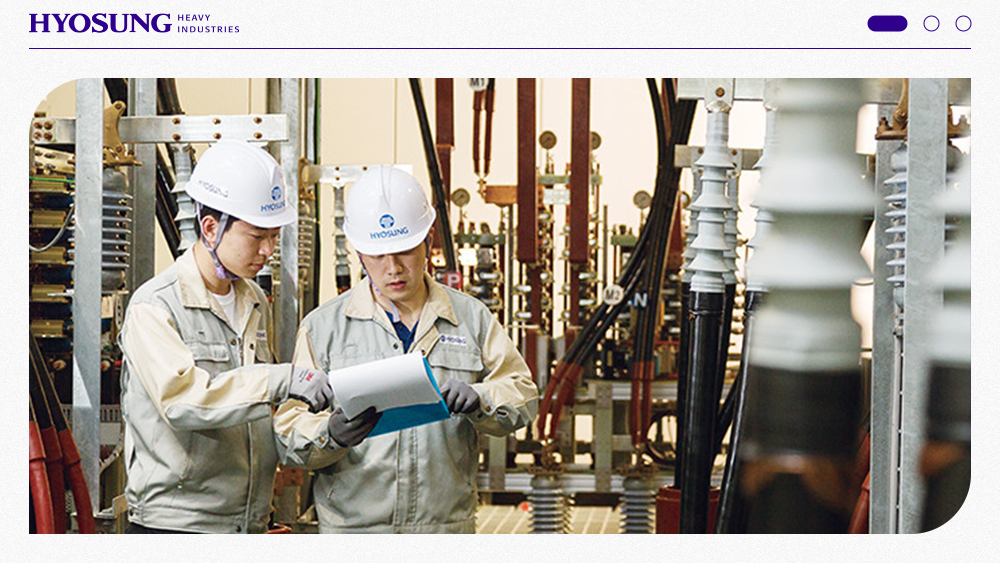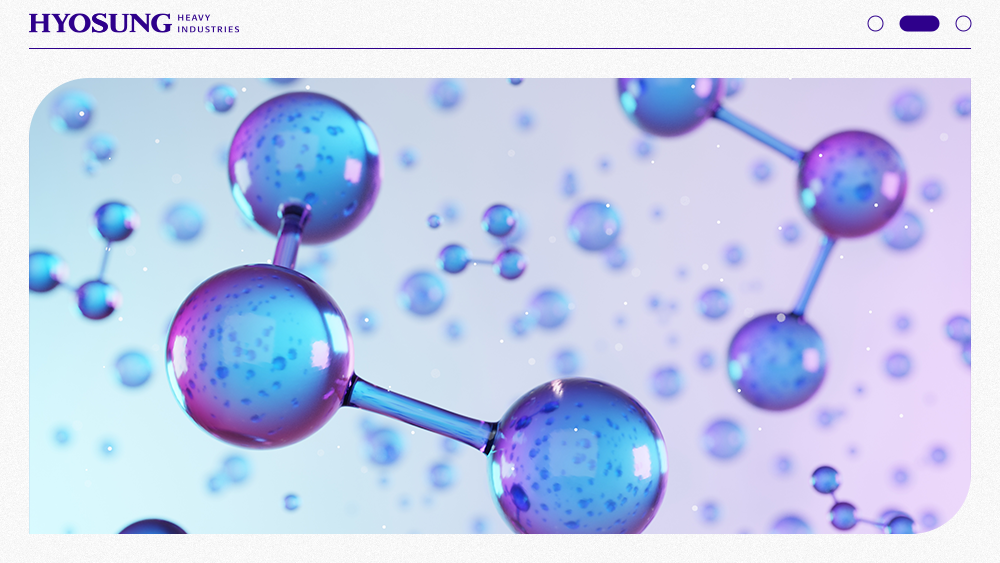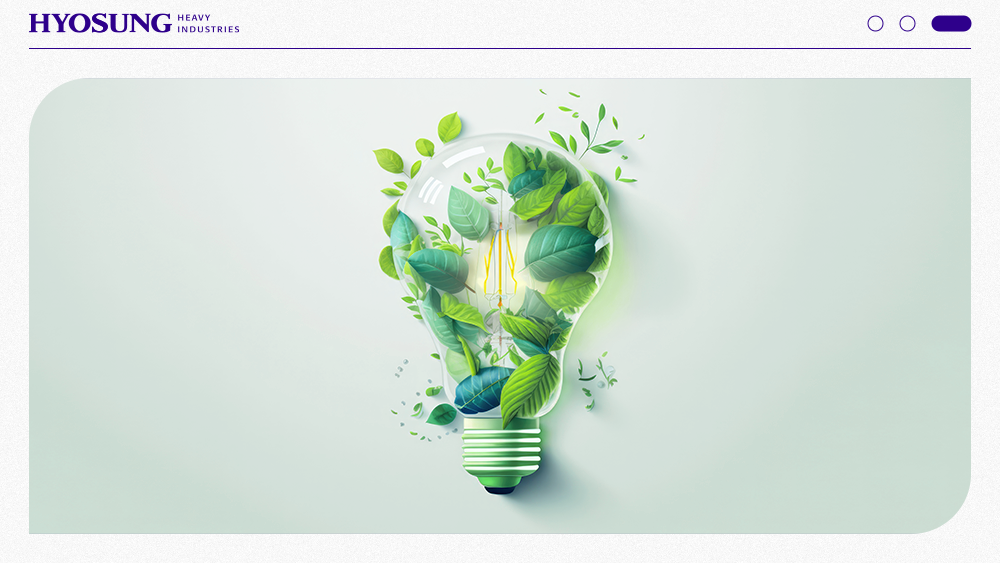RE:GEN 3. New Energy
2023.06.14
There has never been a greater concern for the environment than today, as environmental conservation and the climate change have become paramount issues. Many people recognize the severity of the climate crisis due to unprecedented heat waves, torrential rains, and typhoons. Increasing calls to replace fossil fuels such as oil and coal with clean, sustainable energy sources have been made in response to the devastating impact of fossil fuels on nature.
As we enter a new era of energy, we must transition from fossil fuels to electric energy, which boasts significantly higher efficiency. Hyosung is committed to improving power infrastructure through decarbonization, accelerating hydrogen energy commercialization, and developing environmentally friendly solutions using eco-friendly insulating materials for electrical and industrial devices. Hyosung strives to supply and utilize clean energy from nature, such as wind, solar power, and hydrogen.
Envisioning a New Energy Era through Decarbonization
The push to reduce fossil fuel energy consumption stems from carbon emissions. Typically, fossil fuels are burned to generate energy, releasing carbon dioxide into the atmosphere. In response to these issues, electric energy has gained attention as a means of reducing carbon emissions simultaneously. It offers improved energy efficiency compared to fossil fuels and reduces air pollution and carbon emissions. Hyosung Heavy Industries, a global leader in total energy solutions, leads various efforts to enhance power infrastructure, electrify it, and decarbonize it. As part of these efforts, Hyosung is also focuses on developing systems that stably store and transmit energy from natural sources such as wind and solar power.

Hyosung Heavy Industries has successfully localized South Korea's first Medium Voltage Direct Current (MVDC) transmission system for renewable energy and secured its first order. The MVDC system transmits medium voltage electricity at 1.5-100kV as direct current. Compared to the current alternating current (AC) transmission method, MVDC offers less power loss over long distances, can utilize existing transmission facilities, and can transmit 40% more electricity. This makes it an emerging method for efficiently transmitting renewable energy sources such as wind and solar power. Hyosung Heavy Industries plans to supply its domestically produced MVDC technology to Jeollanam-Do. Another technology that the company possesses is STATCOM, a domestically exclusive and internationally recognized technology in the field.
STATCOM enables the stable supply of renewable energy, which can fluctuate rapidly depending on weather conditions, by maintaining a constant output voltage, ensuring a stable power supply. Lastly, Energy Storage Systems (ESS) significantly contribute to the commercializing renewable energy. These systems are crucial for stably using renewable energy sources with inconsistent generation capacities. Hyosung Heavy Industries has successfully entered the European ESS market, earning global recognition for its quality and technical capabilities.
Hydrogen Society Started from Hyosung’s Hydrogen Value Chain
Among the various clean energies that replace fossil fuels, hydrogen energy has the greatest potential for commercialization. Hydrogen can be obtained from water; when used as fuel, it does not produce pollutants that cause the greenhouse effect. Instead, hydrogen, which turns into water vapor, becomes water again, making it one of the resources that can be obtained endlessly. Hydrogen, which is most abundant on Earth in the form of water!
Hyosung is focusing on hydrogen as the driving force for the future Earth and as a key energy that will lead the energy industry in the near future. At the group level, Hyosung is building a hydrogen value chain and developing various technologies to lead the hydrogen society. Hyosung Chemical produces and sells the by-product hydrogen. Hyosung Advanced Materials leads the commercialization of hydrogen cars with carbon fibers that go into hydrogen car fuel storage devices. Hyosung TNC is leading the way with a fuel tank liner made of nylon. In addition, Hyosung Heavy Industries is making company-wide efforts for the hydrogen society, such as expanding green hydrogen production using renewable energy such as solar and wind power and operating hydrogen fueling stations. Energy technologies to reduce carbon do not change at once, and particularly hydrogen and renewable energy cannot replace all fossil energy in a short time, but Hyosung's goal of building a hydrogen value chain is to lead the hydrogen society, reduce carbon emissions, and decarbonize through hydrogen energy and clean energy.

Hyosung's Steps Towards a Hydrogen Vision
Hyosung is diligently striving to expedite the transition toward a hydrogen society. Despite varying roles within individual companies, they share a common goal of achieving a hydrogen economy.
Hyosung Chemical intends to utilize byproduct hydrogen, produced during the manufacture of high-purity propylene, a key component of Hyosung Chemical's proud polypropylene, in the creation of liquid hydrogen. Hyosung Heavy Industries is constructing a hydrogen liquefaction plant with an impressive capacity of 13,000 tons on the premises of the Ulsan Yongyeon factory, aimed to be completed within the year. This facility, a singular entity boasting the world's largest scale, promises to supply enough fuel to power a hundred thousand passenger vehicles. To this end, an agreement has been made with Linde Group, a German industrial gas specialist chemical company, to cooperate on everything from the production of liquid hydrogen to transportation and fueling facility installation and operation.
Upon completion, the full-scale operation is planned from May 2023. The plant will produce blue hydrogen, which reduces carbon dioxide emissions, by developing and utilizing Carbon Capture, Utilization, and Storage (CCUS) technology. Creating blue hydrogen, a next-generation eco-friendly energy, by capturing carbon dioxide emitted during product manufacturing at Hyosung Chemical, showcases the most practical approach to achieving carbon neutrality by transforming carbon into clean energy. Furthermore, Hyosung Heavy Industries partnered with the Jeollanam-Do to develop the green hydrogen industry and has broken ground on a marine wind power generation assembly plant. Hyosung, currently constructing the country's largest 10MW-class electrolysis facility, plans to increase the green hydrogen production volume to a maximum annual output of 200,000 tons.
Not only in the realm of liquid hydrogen but also in the commercialization of hydrogen vehicles, Hyosung is making significant efforts. Hyosung Heavy Industries is spearheading the establishment of liquid hydrogen fueling stations in the regions of Ulsan, Gwangyang, Geoje, and Gyeongsan and planning to build a large-scale liquid hydrogen fueling station along with approximately 120 hydrogen fueling stations in critical national hub areas for the supply of liquid hydrogen produced at the factory. By constructing these liquid hydrogen fueling stations, Hyosung anticipates contributing to the commercialization of hydrogen vehicles. Additionally, Hyosung Advanced Materials and Hyosung TNC are leading the way in the commercialization of hydrogen by developing essential materials for it.
Hyosung Advanced Materials primarily develops and produces carbon fiber, a material used in hydrogen vehicle fuel tanks. The application of carbon fiber fuel tanks is expected to significantly contribute to accelerating the commercialization of hydrogen vehicles by enhancing their safety, durability, and energy efficiency. Also, Hyosung TNC, for the first time among domestic companies, has utilized nylon as a liner material for hydrogen fuel tanks. This liner, an inner molded plastic of a nylon hydrogen fuel tank, is vital in preventing hydrogen leakage. Compared to the previously used metal liner, it is lighter and more durable, thus becoming a spotlighted key material that increases the energy efficiency of hydrogen vehicles. Hydrogen vehicles utilizing fuel tanks equipped with Hyosung TNC's carbon fiber and nylon liner are expected to elevate safety, durability, and energy efficiency, thus substantially accelerating the commercialization of hydrogen vehicles.

Additional Endeavors for Renewable Energy Utilization
Hyosung is dedicated to addressing various challenges and developing practical alternatives to fossil fuels in hydrogen and renewable energy utilization. In particular, Hyosung strives to develop and supply products that replace insulating materials in power and industrial equipment with eco-friendly alternatives, thereby enhancing efficiency. Hyosung Heavy Industries has signed an MOU with the Korea Electric Power Research Institute and developed an eco-friendly gas-insulated switchgear that substitutes the sulfur hexafluoride (SF6) gas commonly used in circuit breakers.
SF6 gas is advantageous due to its excellent insulation and non-flammability, but its greenhouse gas emissions and negative environmental impact demand eco-friendly alternatives. Hyosung Heavy Industries has independently developed a 170kV eco-friendly gas-insulated switchgear and a circuit breaker utilizing a Vacuum Interrupter, which emits no greenhouse gases. Preceding the development of eco-friendly circuit breakers, Hyosung Heavy Industries has also replaced mineral oil previously used in transformers with biodegradable insulating oil, capable of decomposing over 60% naturally while ensuring fire safety. By contributing to environmental risk reduction, Hyosung Heavy Industries continues to expand its eco-friendly product lineup, preparing diverse solutions to replace materials in power and industrial equipment and enhance energy efficiency.
In the face of the climate crisis, there is no longer any excuse for burning fossil fuels for convenience. Hyosung is exploring new energy sources to replace fossil fuels and searching for efficient commercialization methods for a better Earth, a better environment, and safer lives for future generations. Hyosung's technologies aim to use nature's energy to maintain a sustainable environment and prevent further damage to the planet. Combining Hyosung's technological DNA with perseverance, Hyosung aspires to build a better world powered by clean energy. Hyosung is committed to continuing research and development to ensure that generations in the future will enjoy a cleaner, safer world powered by clean energy.